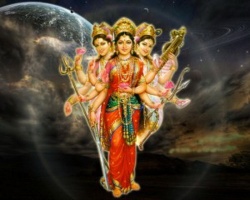Difference between revisions of "Devaloka"
| Line 1: | Line 1: | ||
[[File:Vishweshwari-30.jpg|thumb|250px|]] | [[File:Vishweshwari-30.jpg|thumb|250px|]] | ||
| − | |||
| − | |||
| − | In [[Buddhism]], a [[deva loka]] is a dwelling place of the [[Buddhist]] [[devas]]. The [[worlds]] of the [[devas]] differ greatly from each other depending on the [[nature]] of their inhabitants. | + | In [[Indian]] [[religions]], a [[devaloka]] or [[deva loka]] is a [[plane of existence]] where [[gods]] and [[devas]] [[exist]]. T |
| + | |||
| + | he [[deva lokas]] are usually described as places of [[eternal]] [[light]] and [[goodness]], similar to the {{Wiki|concept}} of [[Heaven]]. | ||
| + | |||
| + | [[Teachers]] of different [[Hindu]] denominations may call such homes of the [[gods]] by other names, [[including]] [[Svarga]], each differing in non-fundamental aspects. | ||
| + | |||
| + | To [[Hindus]], [[Devaloka]] is a plane of [[blissful]] [[existence]] that can be reached as soon as one is sufficiently attuned to [[light]] and good. | ||
| + | |||
| + | However, to become even better and to learn more, one must return to a [[life]] on [[Earth]], until all the {{Wiki|learning}} possibilities here have been exhausted. | ||
| + | |||
| + | Then, any other [[lives]] become unnecessary and [[liberation]] ([[moksha]]) is achieved. | ||
| + | |||
| + | When that happens, the [[practitioner]] can even reach higher planes, such as [[Vaikuntha]] and [[Sivaloka]] ([[Kailasa]]), places of union with [[Vishnu]] and [[Shiva]]. | ||
| + | |||
| + | In [[Buddhism]], a [[deva loka]] is a dwelling place of the [[Buddhist]] [[devas]]. | ||
| + | |||
| + | The [[worlds]] of the [[devas]] differ greatly from each other depending on the [[nature]] of their inhabitants. | ||
{{W}} | {{W}} | ||
[[Category:Heavens]] | [[Category:Heavens]] | ||
[[Category:Deva's]] | [[Category:Deva's]] | ||
Latest revision as of 09:47, 25 March 2016
In Indian religions, a devaloka or deva loka is a plane of existence where gods and devas exist. T
he deva lokas are usually described as places of eternal light and goodness, similar to the concept of Heaven.
Teachers of different Hindu denominations may call such homes of the gods by other names, including Svarga, each differing in non-fundamental aspects.
To Hindus, Devaloka is a plane of blissful existence that can be reached as soon as one is sufficiently attuned to light and good.
However, to become even better and to learn more, one must return to a life on Earth, until all the learning possibilities here have been exhausted.
Then, any other lives become unnecessary and liberation (moksha) is achieved.
When that happens, the practitioner can even reach higher planes, such as Vaikuntha and Sivaloka (Kailasa), places of union with Vishnu and Shiva.
In Buddhism, a deva loka is a dwelling place of the Buddhist devas.
The worlds of the devas differ greatly from each other depending on the nature of their inhabitants.
